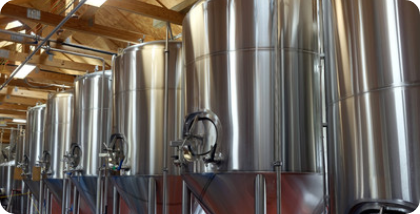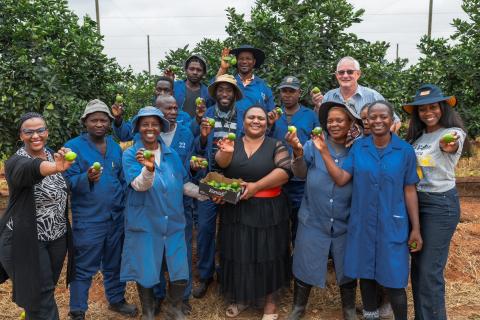
Johannesburg. 26 March 2018. The South African Breweries (SAB), Department of Small Business (DBSD) and the Department of Agriculture and Rural Development (DARD) in Kwa-Zulu Natal, today, handed over farming infrastructure to one of four KZN beneficiary women-owned and women-run maize farms of the Women in Maize programme.
Ekuphileni Poultry and Agricultural Farming Cooperative Ltd, based in Utrecht, KZN, is a majority women-owned yellow maize farm with a total of 290 hectares of land specialising in poultry and small scale vegetable farming. Through the Women in Maize programme the Co-op planted 290ha of non-GMO yellow maize. A yield of 6, 6 tonnes per hectare, or 1918, 4 tonnes, was achieved from this farm.
The total investment to date in Ekuphileni is approximately R6.4-million with a further R350 000 in grant funding for machinery from the Department of Small Business Development underway.
In KZN alone, the Women in Maize programme supports 163 farmers and their teams, farming a total of 1130 hectares of land, through a total investment of approximately R24-million.
The other women-owned beneficiary farms in KZN are Ubuhle Benvelo Poulty, Sizanani CPA and Othaka Trust.
Women-in-Maize, a multimillion-rand investment by SAB, the Department of Small Business Development, and provincial government departments, supports the empowerment of women-run yellow maize farms by providing them with market access and infrastructure, and was first launched in November 2015 when planting began.
The programme was first launched in November 2015 when planting began and the first harvest was reaped in May 2016 at 11 inaugural participating cooperative farms in Kwa-Zulu Natal, Gauteng and Mpumalanga.
A total the 11 cooperatives will supply SAB with a percentage of its yellow maize requirement.
The Women in Maize programme seeks to increase the inclusion of black women owned cooperatives in SAB’s supply chain; form strengthened and sustainable cooperatives; develop skills of women farmers operating in under-served communities through training and mentorship; provide access to market by assuring the purchase of raw materials; improving community livelihoods by increasing income; improving food security; and stimulate local economies by increasing procurement of local suppliers.
“We understand and recognise that while agriculture provides the livelihood of thousands in our rural communities, it can be a great challenge for the smallholder farmer to advance beyond basic subsistence farming and enter into the commercial supply chains of big businesses. We work with small scale farmers to overcome these challenges while ensuring land is used responsibly, food supply is secure, biodiversity is protected and crops can be accessed at reasonable prices,” says Doreen Kosi, Vice President Legal and Corporate Affairs.
The Department of Small Business is an important partner in that it assists farmers with business needs analysis, business training, links farmers and relevant municipal and provincial partners, facilitates infrastructure funding, and assists with the registration of cooperatives and the monitoring of these.
One of the fundamental pillars of SAB’s sustainable agriculture strategy is ensuring farmers are skilled, financially empowered and connected. SAB believes in upskilling farmers with the latest in agronomic, operational and best practices; ensuring they have access to financial services from a formal institution based on local needs, and providing the data, insights and analytics enabling them to make informed decisions.
In 2017, SAB committed to investing an incremental R610-million into agricultural development in South Africa by 2021 as part of its Public Interest Commitments made to the South African government at the time of the business combination between SAB and AB Inbev.
SAB’s agricultural programmes are focused on driving competitive and sustainable volume growth in the local production of hops, maize and barley, while leading transformation in the broader agricultural sector. With a diverse team of agronomists and researchers, SAB maintains active contracting and development programmes across the country.
The investments will drive four main objectives:
- Expanding barley production to 475 000 metric tons per annum (off a 300 00 metric ton base)
- Enabling South Africa to become a net exporter of hops as opposed to a net importer, using unique local aroma varieties.
- Incorporating an additional 800 emerging growers into the hops, barley and maize supply chains.
- Catalysing the creation of over 2 500 jobs within the agricultural sector.
“Over recent years, SAB has up-weighted its investment in the local agricultural sector, with a particularly focus on developing, through several support streams, emerging black farmers and women farmers as seen through the Women-in-Maize programme.
“By sourcing raw materials directly from farmers in South Africa, SAB is establishing local supply chains which help reduce costs, improve efficiencies, create jobs and ultimately, strengthen local economies,” says Kosi.



